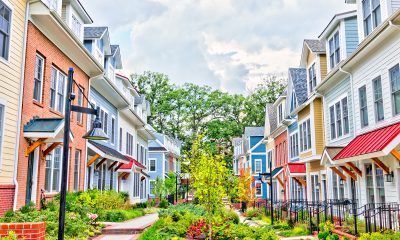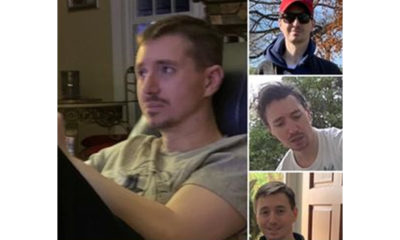Virginia
Arlington church seeks to offer LGBTQ-affirming senior housing
Project by Clarendon Presbyterian faces opposition from residents
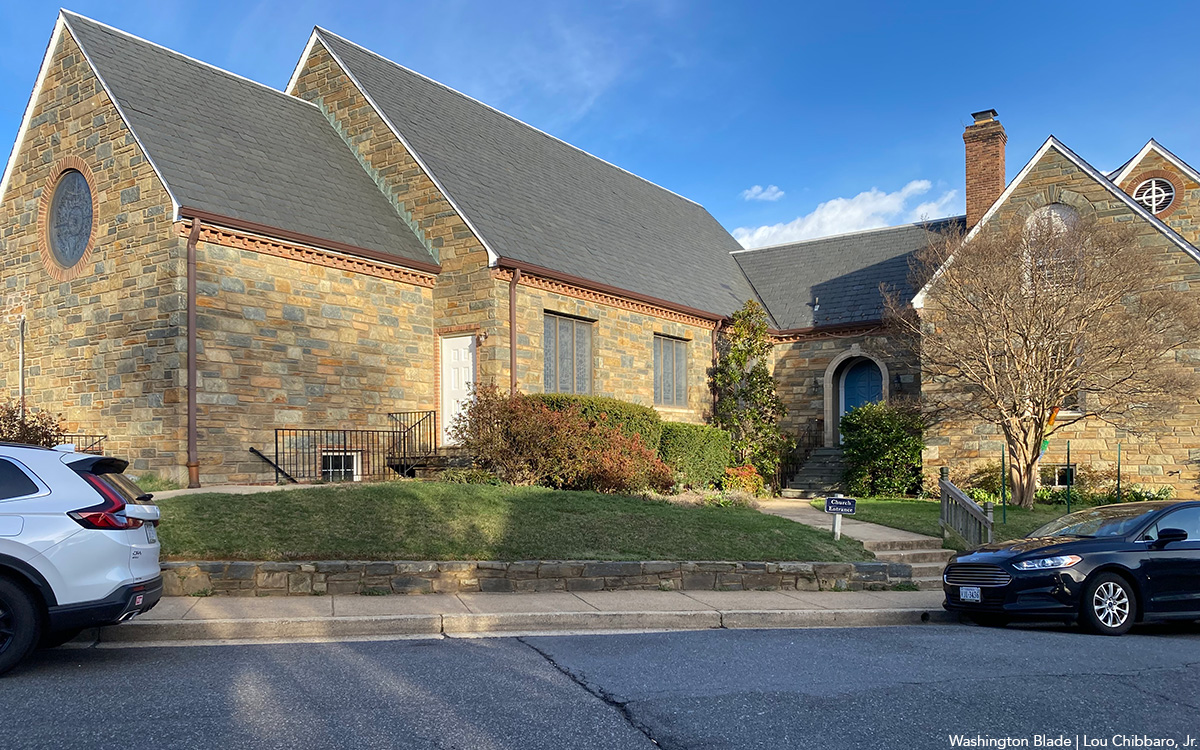
Leaders and members of the Clarendon Presbyterian Church, which will celebrate its 100th anniversary on April 13, have said they decided to continue to fulfill their mission of religious faith by using the land on which their church is located in the Clarendon section of Arlington, Va., to develop a new, larger church building to include LGBTQ affordable housing for seniors along with an independently run childcare center that currently operates in the church.
“In line with the church’s deep history of supporting affordable housing, LGBTQ communities, and seniors, in 2021, the church relaunched a visioning process of how we might invest our most valuable physical resources, our church property, for the good of the community,” church leaders said in a Feb. 9, 2024, statement describing the project.
The statement says that in 2022, the congregation voted to partner with the Arlington Partnership for Affordable Housing (APAH), a real estate development company that specializes in affordable housing projects. Through that partnership, the statement says, the two partners in June of 2023 applied to the Arlington County government for a zoning change that would allow the construction of a building that could accommodate as many as 92 residential apartments for seniors 55 or 62 and older.
Among other things, the project calls for demolishing the current church building and constructing a new, larger building that would include a smaller version of the church space for its religious services as well as space for 40 to 58 children ages two through six at the Clarendon Child Care Center, which has operated at the church for more than 60 years.
Rev. Alice Tewell, the current pastor at Clarendon Presbyterian Church, told the Washington Blade another important factor contributing to the decision to redevelop the church property is the high cost of maintaining a 100-year-old building and its aging infrastructure that was becoming less and less affordable for the church’s budget. And like many churches across the country, the membership of Clarendon Presbyterian Church has declined over the years, making it no longer necessary for a worship service space as large as that in the current church building, Tewell said.
The statement describing the development plan says that without a major redevelopment project, the church could no longer afford to remain in the current building, forcing it to move to another location outside of Clarendon and possibly outside of Arlington.
According to Rev. Tewell, the redevelopment decision came after several years of internal discussion, meetings with longtime church allies, including members of the LGBTQ community and other community groups.
“And after all these conversations, we came to where we could serve Christ, which is part of our faith, and where we could be good neighbors in Arlington – would be to tear down our entire property and rebuild so it would include senior affordable housing as LGBT welcoming, a new church space, which we also plan to turn into a community space, and the new space for our preschool center,” Tewell told the Blade.
She noted that the church’s location at 1305 N. Jackson St. is walking distance to the Clarendon Metro station and many local amenities such as restaurants and retail stores, making it a convenient location for the senior residents in the redeveloped space.
She also points out that church members have consulted with the New York-based LGBTQ seniors advocacy organization SAGE, which informed them of the great need for LGBTQ welcoming senior housing, including in Northern Virginia.
But news of the church’s redevelopment project, especially reports that it would include a proposed 92-unit apartment building, prompted many nearby residents to raise strong objections and to call on the Arlington County Board, which must make a final decision on a zoning change, to deny the zoning change request.
Most of the opposition comes from residents of single-family houses, who point out that the church is located in a largely low-density residential neighborhood with just a few nearby low-rise apartment buildings. In August of 2023, a group of nearby residents created an online petition that gathered at that time more than 1,000 signatures calling for the county to turn down the church development project.
“We, the concerned residents of Arlington, Virginia, stand united in opposition to the proposed destruction of the historic, over 100-year-old, Clarendon Presbyterian Church (CPC) and the subsequent construction of a massive 6-story apartment building having 100 units within our cherished residential neighborhood,” the petition states. “We believe that this development project will have serious detrimental effects on our community’s character, quality of life, and historic heritage,” it says.
The Arlington Partnership for Affordable Housing, or APAH, the development company working in partnership with the church, submitted an official application on June 29, 2023, for a Special General Land Use Plan Study calling for the needed zoning change for the church project with Arlington County Zoning Administrator Arlova Vonhm. APAH officials have said the initial application was the first of a multi-step process seeking final approval of the project.
Garrett Jackson, APAH’s Director of Resource Development and Communications, told the Blade that APAH on behalf of the church asked the Zoning Administrator to put the application on hold while the church and APAH consider revisions for the project.
“We are currently working with our architect, engineer, and construction management team to assess the feasibility of different development options while also considering feedback we have received from the county and the community,” Jackson told the Blade in a March 15 email.
In a phone interview with the Blade on March 21, Jackson and APAH officials Mitchell Crispell and Brian Goggin, said the decision to put the project on hold did not come as a result of an informal message from the Zoning Administrator that the project was about to be turned down.
“So, we were the ones that put it on hold,” said Crispell, APAH’s Director of Real Estate Development. “It wasn’t the county that said no to us at all. We wanted to kind of pause for a minute and consider our options, the feasibility of different options and the development plans,” he said.
Crispell noted that the decision to put the project on hold came last fall, a few months after the application was submitted in June and after strong opposition to the project surfaced by nearby residents. Crispell, Jackson, and Goggin pointed out, however, that opposition to development projects is a common phenomenon in Arlington and other jurisdictions and that ongoing dialogue between developers and concerned residents often leads to a resolution to the objections.
“We understand the back and forth that it takes to get these projects to fruition,” Jackson said. “So, you’ve got to rest assured that this is very much a part of the very thorough process that both APAH and the county go through regularly to make sure that we’re getting the absolute best product in the actual building that will go up for Clarendon Presbyterian Church and for the future residents,” Jackson points out.
Jackson and his two APAH colleagues said they couldn’t immediately predict when they will resubmit the application for the zoning change. Spokespersons for the Zoning Office, the Arlington County Board, and Arlington County Manager Mark Schwartz didn’t immediately respond to a request by the Blade for comment on the church project and the likelihood of the county approving the project.
Among those supporting the church project is James Fisher, a longtime Arlington LGBTQ rights advocate and longtime church member. Fisher and Arlington gay civic activists Jay Fisette, a former elected member of the Arlington Board, and longtime Arlington resident Bob Witeck, who support the project, told the Blade they believe many nearby residents also support the church development project.
Fisette and Witeck said they do not believe anti-LGBTQ bias is a significant factor, if a factor at all, in the opposition to the church project.
“I personally observe this as disquiet about building a larger and taller presence in a space that abuts residential neighbors unsure of the implications or stresses that might come,” Witeck said. “I’m no Pollyanna, but really believe that with time, this change will be smoother than people fear or imagine,” he said.
Fisette said the church project comes a short time after the Arlington County Board adopted an “Expanded Housing Options” policy that allows for larger residential buildings in some areas originally zoned for low-density, single-family homes. This change drew objections among many residents in areas similar to where Clarendon Presbyterian church is located.
“I would say the LGBTQ elements of the proposal are likely more of a plus than a minus,” Fisette told the Blade. “I expect 99 percent of any resistance-anxiety relates to density and the real-feared impacts of that density,” he said.
Tewell told the Blade the church’s support for the LGBTQ community dates back to the 1980s, when church members voted in support of a then-controversial proposal to allow the D.C.-based Whitman-Walker Clinic, which had a Northern Virginia outreach, to use space in the church for a support group for people with HIV/AIDS and for HIV caregivers.
“And that started changing the church to becoming a church that was very welcoming to LGBTQ people,” she said, adding that the church subsequently opened its door for LGBTQ community events, some of which were organized by gay church member James Fisher. Among those using the church now is IMPACTO LGBT, a Spanish-speaking LGBT church that holds its worship services at Clarendon Presbyterian Church.
“This is how we are living out our faith in the world,” Tewell said. “We worked out what does God’s embodied love look like for the world? And how do we embody God’s grace, justice, and love? And we really feel that it is through housing for seniors that is welcoming to LGBTQ+ people,” she added. “And to transform our church space so it’s better equipped to welcome the community.”
Virginia
Defying trends, new LGBTQ center opens in rural Winchester, Va.
‘It has taught me that I am not alone in this place’
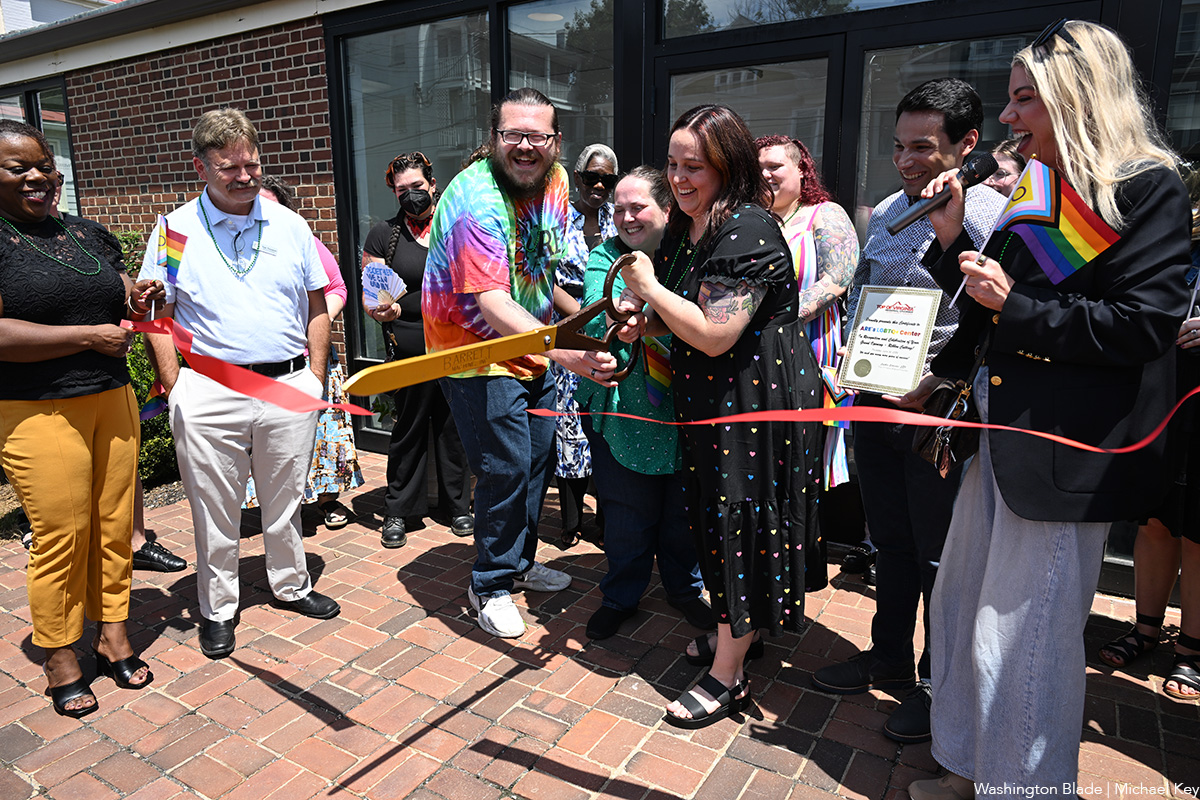
A new LGBTQ community center celebrated its grand opening on June 30 in Winchester, Va., defying recent trends amid a federal crackdown on DEI and LGBTQ funding.
The local HIV/AIDS service organization AIDS Response Effort, Inc. (ARE) worked with a team of volunteers to open the area’s first physical center.
ARE’s R.I.S.E. (Resources, Inclusion, Support and Empowerment) Center, located near the heart of Old Town Winchester on West Piccadilly Street, is more than a renovated bank building to the local LGBTQ community. The empty teller window on the side of the structure and converted vault inside give away the building’s past. But the volunteers, program participants, and well-wishers gathered at the ribbon-cutting ceremony tell the Blade that they are hopeful for a thriving future for the building — and the community.
The Washington Blade spoke with the executive director of ARE as well as the co-directors of ARE’s R.I.S.E. Center during a tour of the facility ahead of the opening.
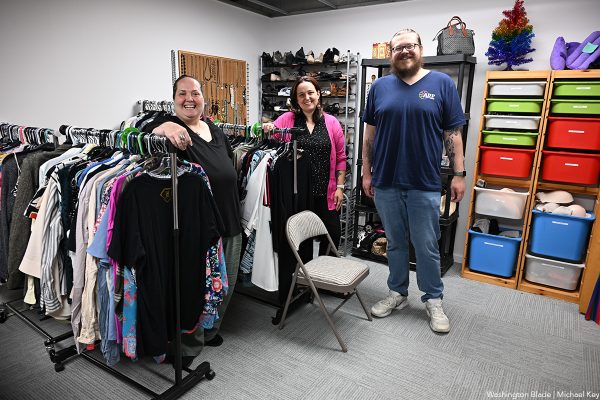
Katy Vance, executive director of ARE told the Blade, “I started [at ARE] about five years ago and we were an AIDS service organization, we have been for about 35 years now. We started as a group of volunteers out at the hospital —with Valley Health, and we’ve grown into a program that provides HIV case management for folks living with HIV in the community.”
Vance explained that as community needs have changed for service organizations like ARE, it has led to some soul-searching among advocates.
“We had this big meeting about, ‘who are we?,’ ‘who do we want to be?,’ ‘who do we want to be in a few years?,’” Vance recalls. “As things shift and change with HIV … we have a lot of folks that come into our office who are newly diagnosed. They will get connected to a medical case manager, they’ll get on medication, and they are undetectable within one to two months, which means they are untransmittable, which is amazing.”
“So, science and technology has come so far,” Vance continued. “And so, who are we when this tends to go in the direction of no longer being the major epidemic it has been for the last 40 years, right?”
“But, when I came in, we also had a general housing program for anyone in the community,” Vance said. “That was confusing for a lot of people who came into our doors trying to figure out who we were and what we are. We called it, our ‘identity crisis,’ essentially.”
“Are we an HIV service organization? Are we a housing program?” Vance asked. “So we worked with our local Goodwill and the board got together and we decided to transition our housing program out and we realized we wanted to open an LGBTQ center.”
“We have had a little bit of pushback as to why an HIV agency is opening a center,” ARE’s R.I.S.E. Center Co-Director Matt Buracker said. “Obviously, HIV and LGBT identities have a long history and a lot of stigma, but we felt like it was kind of irresponsible to talk about one without talking about the other. And we’ve always been supporting the LGBT community, so we’re just expanding our services to encompass more.”
The center seeks to serve the LGBTQ community in a county that Donald Trump carried with more than 63% of the vote in the 2024 election. While ARE receives state and federal grants for its operations, the LGBTQ center is currently funded by community donations and a founders’ campaign and is staffed with volunteers.
Vance tells the Blade that the Center met its initial fundraising goal of $50,000 very quickly. The building housing the center was renovated with a combination of grants, donations and volunteer work.
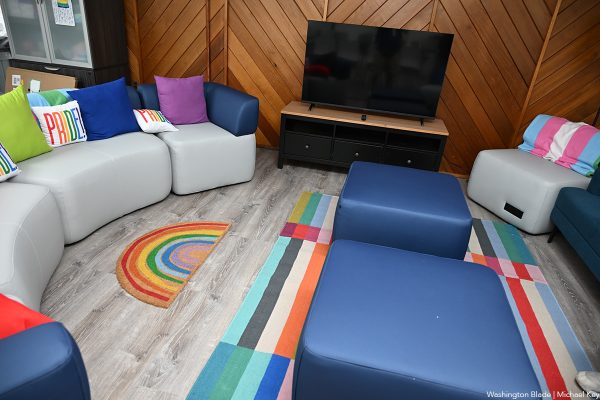
“I think our fundraising goals now are going to be more programmatic so that we can do the things that we want to do,” R.I.S.E. Center Co-Director Mary Bohacek said. “Because Matt and I are great at finding things to do for free. But there are other things that people are asking us to do, craft events or things that aren’t free to do. Eventually, we might need a license if we want to do movie screenings. So there is always going to be a fundraising need to fund the programming, but the building has been a huge success.”
“The support from the community has been overwhelming,” Buracker told the Blade. “We’ve had such a positive response from the community and it’s just it’s been so emotional to see that the need has been here and we are the one to finally do something about it.”
Vance interjected, “And of course, there are community members that aren’t a fan that are ‘keyboard warriors’ that are coming out saying stuff. What is amazing is: we had an article in the paper and they put it up on their Facebook page and people were making just terrible comments. But then, we got new volunteers from that. The community support has been, like Matt said, amazing and overwhelming.”
ARE’s R.I.S.E. Center is a member of CenterLink, a community of LGBTQ centers. Other LGBTQ community centers in the wider region include the Roanoke Diversity Center in Roanoke, Va, the Shenandoah LGBTQ Center in Staunton, Va., Diversity Richmond in Richmond, Va., NOVA Prism Center in McLean, Va., the DC Center for the LGBT Community in Washington, D.C. and the Frederick Center in Frederick, Md. A new MoCo Pride Center is scheduled to open in Bethesda, Md. in August.
While the physical building opened to the public on June 30, the R.I.S.E. Center in Winchester has held events for more than a year.
“We’ve had programming going on for almost two years now,” Bohacek told the Blade. “Our first event was a ‘Friendsgiving.’ There were so many people that showed up that we literally didn’t have enough space: we needed to knock down walls.”
The staff and volunteers at ARE and the nascent Center used that momentum to foster the growth of affinity groups, community groups and services.
Affinity groups are described as “not just support groups or social groups, but rather as something of a hybrid between the two.” As Bohacek says about the affinity groups, “if someone needs community or needs a place to talk about queer issues, they have a space to do that.”
Affinity groups hosted by the Center include a group for trans and gender non-conforming people, a group for the families of trans people, a polyamorous affinity group, an aro-ace group, a “Rainbow Connection” all-purpose group, and a “Gay-RP” affinity group for people 50 and older.
“We also have a young adult group, which is for ages 18-25, which is one of the more vulnerable sections of our community,” Bohacek said. “So we want to make sure that they have places to connect.”
As reported in the Blade, the youth advocacy organizations Hopelab and Born this Way Foundation recently issued a report that suggests LGBTQ youth (ages 15 to 24) living in rural communities face greater challenges than their suburban or urban peers in dealing with their sexual orientation or gender identity, though have significantly benefited from online resources.
“We also have some community-wide programming that allies are welcome attend,” Bohecek said. Programming includes a monthly game night, a volunteer night for the many Center volunteers, as well as the “stitch and bitch” group, who “sit, crochet, embroider and talk.”
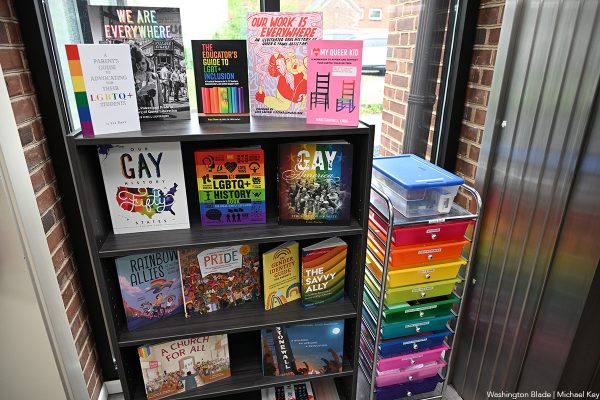
“And Coffee and Coloring!” Bohecek exclaims. “That’s one of my favorites. We like to say it’s about — just sit down, relax, have a cup of coffee — but frankly it’s about community building.”
Bohacek proudly lists the many other services the center offers, including a transgender/gender-affirming closet, which is currently overflowing with donations of clothes.
“We also have an amazing library of all kinds of identities and all kinds of ages for people to come and see,” Bohacek told the Blade. “This building is actually an old bank, so we put our books into the vault.”
The old bank, now vibrant community center, was filled to capacity for the official opening ceremony on a hot Monday afternoon in late June. People from across the Shenandoah Valley who had come to the ribbon-cutting event snacked on rainbow-colored cupcakes as they toured the renovated building.
“To be a gay man growing up in a small, rural area . . . we didn’t have anything like this,” Front Royal, Va. resident Ed McKee told the Blade. Though he lives in a town a few miles away, he works at a salon in Winchester and had come to see the new center opening.
“We didn’t have anything like this when I was growing up,” McKee said as he gestured toward the packed LGBTQ community center. “If we had, it would have made my life so much easier. I probably would have come out sooner — I didn’t come out until I was about 30 — because I would have felt the support, you know?”
“Especially now with everything that is going on in our country,” McKee continued. “We need to show strength in numbers: come together. And the center is allowing for that to happen.”
McKee’s husband, Winchester business owner Paul Miller, agreed.
“I’m hoping that [the Center] can be a great way to connect with people who might not otherwise understand how they can come together,” Miller told the Blade. “And I’m hoping that, while I’m not sure that this is its mission, I’m hoping that it has a political effect in Virginia.”
Members of the community who came to witness the opening gathered outside of ARE’s R.I.S.E. center for the ribbon cutting. Speakers at the ceremony included the Center’s co-director Bohacek.
“Today, we’re celebrating the renovation of the building,” Bohacek began. “But, we’re also celebrating the rise of this community.”
“This community has taught me resilience and it has taught me friendship and it has taught me that I am not alone in this place,” Bohacek told the crowd. “There are people that care. And we are so proud to have a place where we can be ourselves, where anyone and everyone is welcome — and we mean it. So, with that said, let’s keep on rising!”
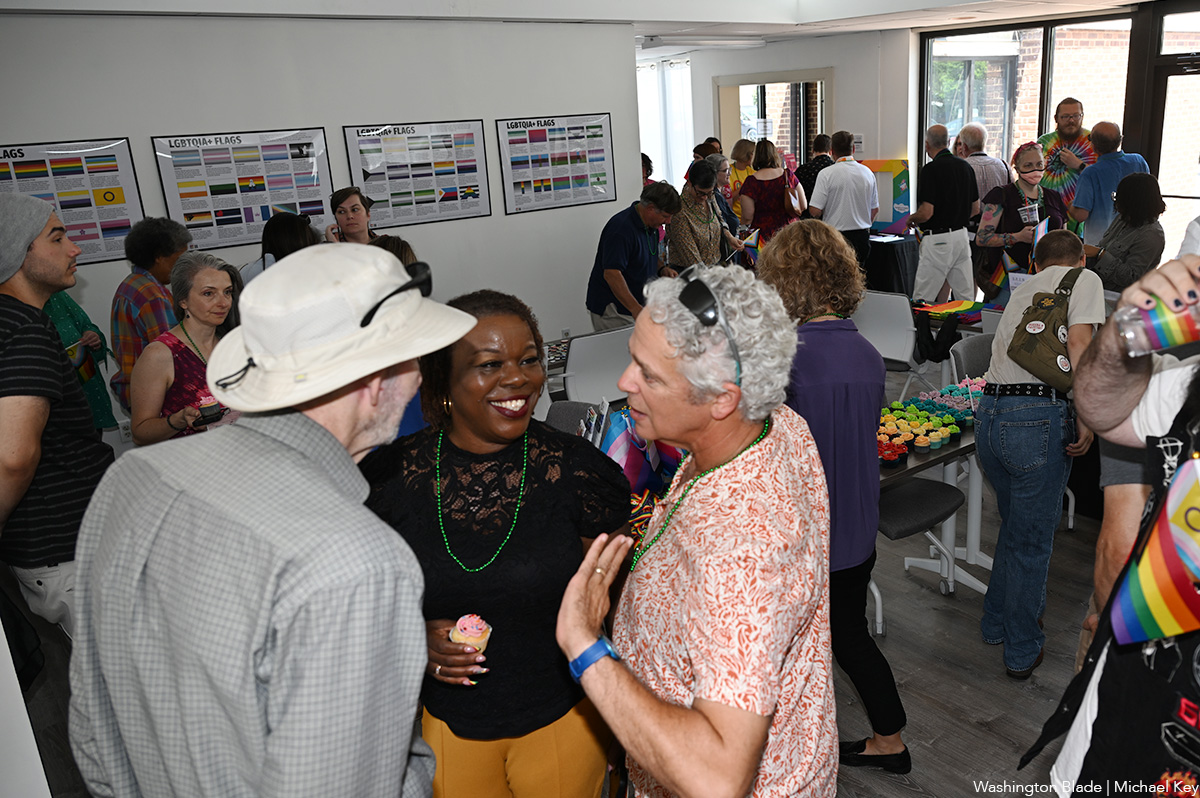
Virginia
Va. court allows conversion therapy despite law banning it
Judge in June 30 ruling cited religious freedom.

In 2020, the state of Virginia had banned the practice of conversion therapy, but on Monday, a county judge ruled the ban violates the Virginia Constitution and Religious Freedom Restoration Act, allowing the therapy to start once more.
The conversion therapy ban, which can be seen in Va. Code § 54.1-2409.5 and 18VAC115-20-130.14, was overturned on June 30 as a result of two Christian counselors who argued that their — and all Virginia parents’ — constitutional right to freedom of religion had been encroached upon when the state legislature passed the ban.
A Henrico County Circuit Court judge sided with John and Janet Raymond, two Christian counselors represented by the Founding Freedoms Law Center, a conservative organization founded in 2020 following Virginia’s conversion therapy ban. Virginia’s Office of the Attorney General entered a consent decree with FFLC, saying state officials will not discipline counselors who engage in talk conversion therapy.
Conversion therapy, as the legislation described it, is considered to be “any practice or treatment that seeks to change an individual’s sexual orientation or gender identity, including efforts to change behaviors or gender expressions or to eliminate or reduce sexual or romantic attractions or feelings toward individuals of the same gender.” The ban’s reversal will now allow parents to subject their children to these practices to make them align better with their religion.
This decision comes despite advice and concern from many medical and pediatric organizations — including the American Psychiatric Association, American Psychological Association, American Association for Marriage and Family Therapy, and the American Counseling Association, to name a few — all of which denounce conversion therapy as dangerous and harmful to those subjected to it.
The American Medical Association, the largest and only national association that convenes more than 190 state and specialty medical societies, says that “these techniques are the assumption that any non-heterosexual, non-cisgender identities are mental disorders, and that sexual orientation and gender identity can and should be changed. This assumption is not based on medical and scientific evidence,” with attached data indicating people subjected to conversion therapy are more likely to develop “significant long-term harm” as a result of the therapy.
The AMA goes as far as to say that they outright “oppose the use of reparative or conversion therapy for sexual orientation or gender identity.”
FFLC has a clear goal of promoting — if not requiring — conservative ideology under the guise of religious freedom in the Virginia General Assembly. On their website, the FFLC argues that some progressive policies passed by the Assembly, like that of freedom from conversion therapy, are a violation of some Virginians’ “God-given foundational freedoms.”
The FFLC has argued that when conservative notions are not abided by in state law — especially when it involves “God’s design for male and female, the nuclear family, and parental rights” — that the law violates Virginians’ religious freedom.
A statement on the FFLC’s website calls gender dysphoria among children a “contagion” and upholds “faith-based insights” from counselors as equal — in the eyes of the law — to those who use medical-based insights. This, once again, is despite overwhelming medical evidence that indicates conversion therapy is harmful.
One study showed that 77 percent of those who received “sexual orientation change efforts,” or conversion therapy, experienced “significant harm.” This harm includes depression, anxiety, lowered self-esteem, and internalized homophobia. In addition, the study found that young LGBTQ adults with high levels of parental or caregiver rejection are “8.4 times more likely to report having attempted suicide,” with another study finding that “nearly 30 percent of individuals who underwent SOCE reported suicidal attempts.”
Virginia Senate Majority Leader Scott Surovell, a Democrat representing Fairfax, said that the overturning of the ban on religious merit disregards the entire concept of having professionally licensed counselors.
“I have no problem if somebody wants to go look at religious counseling from their priest or their minister, their rabbi, their imam — that’s perfectly fine,” Surovell told the Virginia Mercury. “When somebody goes to get therapy from somebody licensed by the commonwealth of Virginia, there’s a different set of rules applied. You can’t just say whatever you want because you have a license. That’s why we have professional standards, that’s why we have statutes.”
Virginia
Walkinshaw wins Democratic primary in Va. 11th Congressional District
Special election winner will succeed Gerry Connolly

On Saturday, Fairfax County Supervisor James Walkinshaw won the Democratic primary for the special election that will determine who will represent Virginia’s 11th Congressional District.
The special election is being held following the death of the late Congressman Gerry Connolly, who represented the district from 2008 until 2024, when he announced his retirement, and subsequently passed away from cancer in May.
Walkinshaw is not unknown to Virginia’s 11th District — he has served on the Fairfax County Board of Supervisors since 2020 and had served as Connolly’s chief of staff from 2009 to 2019. Before he passed away, Connolly had endorsed Walkinshaw to take his place, claiming that choosing Walkinshaw to be his chief of staff was “one of the best decisions I ever made.”
The Democratic nominee has run his campaign on mitigating Trump’s “dangerous” agenda of dismantling the federal bureaucracy, which in the district is a major issue as many of the district’s residents are federal employees and contractors.
“I’m honored and humbled to have earned the Democratic nomination for the district I’ve spent my career serving,” Walkinshaw said on X. “This victory was powered by neighbors, volunteers, and supporters who believe in protecting our democracy, defending our freedoms, and delivering for working families.”
In addition to protecting federal workers, Walkinshaw has a long list of progressive priorities — some of which include creating affordable housing, reducing gun violence, expanding immigrant protections, and “advancing equality for all” by adding sexual orientation and gender identity to the Fair Housing Act.
Various democratic PACs contributed more than $2 million to Walkinshaw’s ad campaigns, much of which touted his connection to Connolly.
Walkinshaw will face Republican Stewart Whitson in the special election in September, where he is the likely favorite to win.



